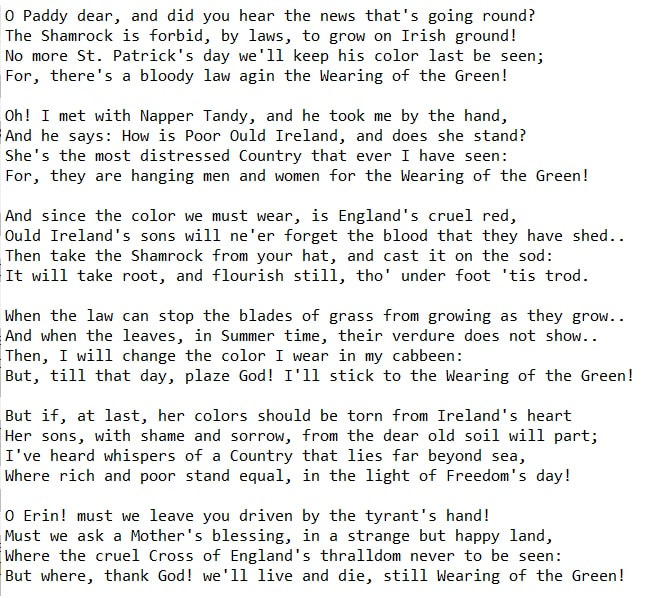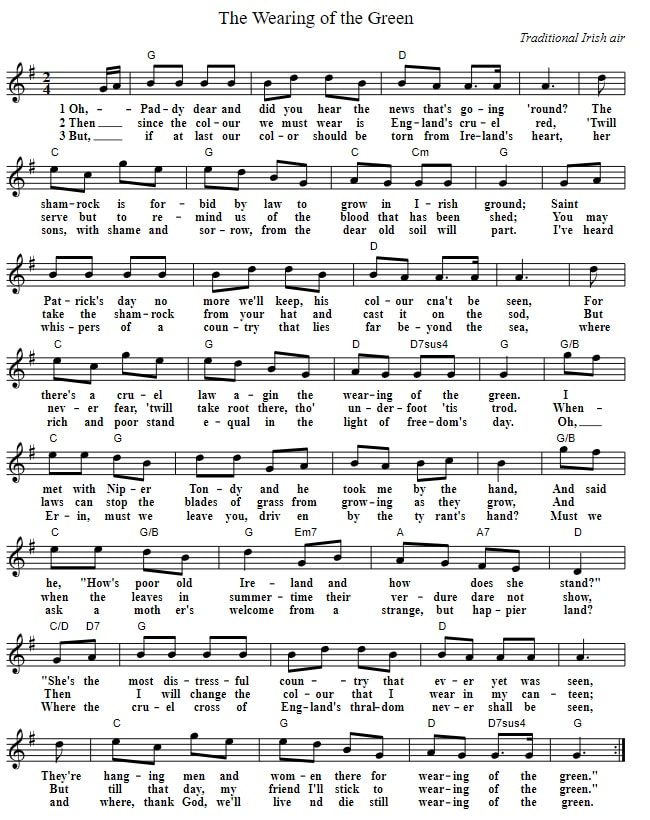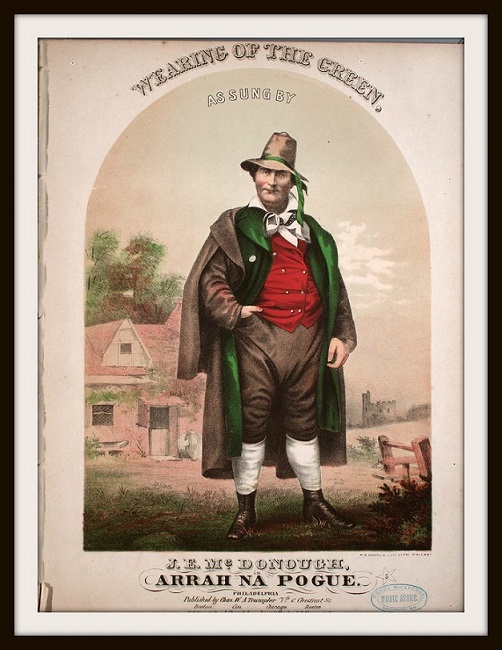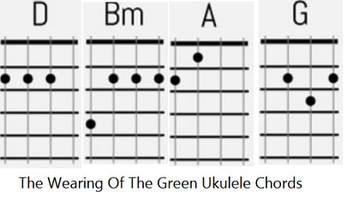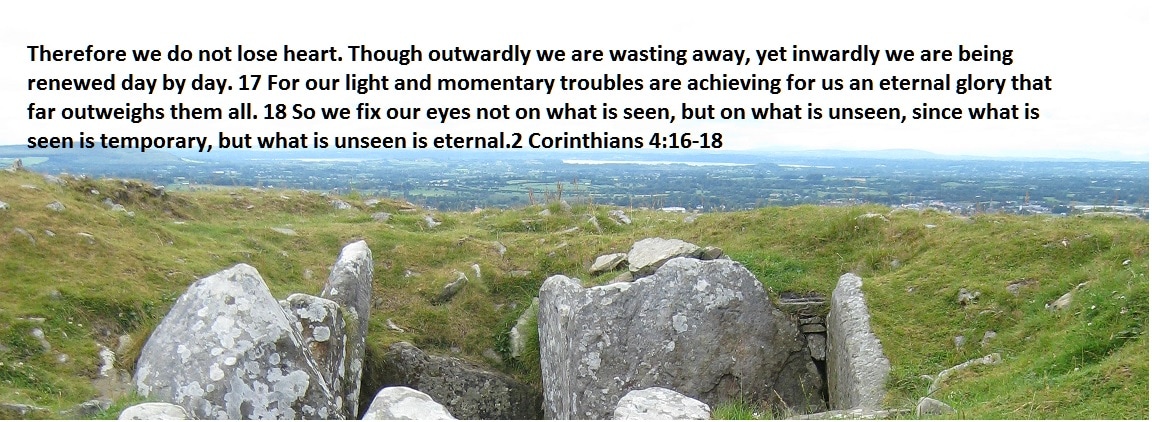The Wearing Of The Green, Irish song lyrics and guitar chord
The full sheet music is included. J.K. Casey. There are many versions of 'The Wearing Of The Green' . The one I have put the chords to is the one that's most popular in Ireland. The video is of The Wolfe Tones, the tune itself is similar to another Irish song ''The Rising Of The Moon Sheet Music'' , same air but different words. J.K. Casey was sometimes called ''Leo'' . An Irish rebel song. The ukulele chords are now included. This ballad is popular around the St. Patrick's Day time of year.
O[D] Paddy dear, and[Bm] did you hear the[A] news that's going round?
The[G] Shamrock is for[D]bid, by laws, to[A] grow on Irish[D] ground!
No[D] more St. Patrick's[Bm] day we'll keep his[A] color last be seen;
For, there's a[G] bloody[D] law agin the[A] Wearing[A7] of the[D] Green!
Oh! I met with Napper Tandy, and he took me by the hand,
And he says: How is Poor Ould Ireland, and does she stand?
She's the most distressed Country that ever I have seen:
For, they are hanging men and women for the Wearing of the Green!
And since the color we must wear, is England's cruel red,
Ould Ireland's sons will ne'er forget the blood that they have shed..
Then take the Shamrock from your hat, and cast it on the sod:
It will take root, and flourish still, tho' under foot 'tis trod.
When the law can stop the blades of grass from growing as they grow..
And when the leaves, in Summer time, their verdure does not show..
Then, I will change the color I wear in my cabbeen:
But, till that day, plaze God! I'll stick to the Wearing of the Green!
But if, at last, her colors should be torn from Ireland's heart
Her sons, with shame and sorrow, from the dear old soil will part;
I've heard whispers of a Country that lies far beyond sea,
Where rich and poor stand equal, in the light of Freedom's day!
O Erin! must we leave you driven by the tyrant's hand!
Must we ask a Mother's blessing, in a strange but happy land,
Where the cruel Cross of England's thralldom never to be seen:
But where, thank God! we'll live and die, still Wearing of the Green!
The[G] Shamrock is for[D]bid, by laws, to[A] grow on Irish[D] ground!
No[D] more St. Patrick's[Bm] day we'll keep his[A] color last be seen;
For, there's a[G] bloody[D] law agin the[A] Wearing[A7] of the[D] Green!
Oh! I met with Napper Tandy, and he took me by the hand,
And he says: How is Poor Ould Ireland, and does she stand?
She's the most distressed Country that ever I have seen:
For, they are hanging men and women for the Wearing of the Green!
And since the color we must wear, is England's cruel red,
Ould Ireland's sons will ne'er forget the blood that they have shed..
Then take the Shamrock from your hat, and cast it on the sod:
It will take root, and flourish still, tho' under foot 'tis trod.
When the law can stop the blades of grass from growing as they grow..
And when the leaves, in Summer time, their verdure does not show..
Then, I will change the color I wear in my cabbeen:
But, till that day, plaze God! I'll stick to the Wearing of the Green!
But if, at last, her colors should be torn from Ireland's heart
Her sons, with shame and sorrow, from the dear old soil will part;
I've heard whispers of a Country that lies far beyond sea,
Where rich and poor stand equal, in the light of Freedom's day!
O Erin! must we leave you driven by the tyrant's hand!
Must we ask a Mother's blessing, in a strange but happy land,
Where the cruel Cross of England's thralldom never to be seen:
But where, thank God! we'll live and die, still Wearing of the Green!
Any yet another version
One blessing on my native Isle!
One curse upon her foes
While yet her skies above me smile
Her breeze around me blows
Now, nevermore my cheek be wet
Nor sigh, nor altered mien
Till the dark tyrant I regret
The Wearing Of The Green
Sweet land! my parents loved you well
They sleep within your breast
With theirs, for love no words can tell
My bones must never rest
And lonely must my true love stray
That was our village queen
When I am banished far away
For The Wearing Of The Green
But, Mary, dry that bitter tear
'Twould break my heart to see
And sweetly sleep my parents dear
That cannot weep for me
I'll think not of my distant tomb
Nor seas rolled wide between
But watch the hour, that yet will come
For The Wearing Of The Green
O, I care not for the thistle
And I care not for the rose
For when the cold winds whistle
Neither down nor crimson shows
But like hope to him that's friendless
Where no gaudy flower is seen
By our graves, with love that's endless
Waves our own true-hearted green
O, sure God's world was wild enough
And plentiful for all!
And ruined cabins were so stuff
To build a lordly hall
They might have let the poor man live
Yet all as lordly been
But heaven it's own good time will give
For The Wearing Of The Green
One blessing on my native Isle!
One curse upon her foes
While yet her skies above me smile
Her breeze around me blows
Now, nevermore my cheek be wet
Nor sigh, nor altered mien
Till the dark tyrant I regret
The Wearing Of The Green
Sweet land! my parents loved you well
They sleep within your breast
With theirs, for love no words can tell
My bones must never rest
And lonely must my true love stray
That was our village queen
When I am banished far away
For The Wearing Of The Green
But, Mary, dry that bitter tear
'Twould break my heart to see
And sweetly sleep my parents dear
That cannot weep for me
I'll think not of my distant tomb
Nor seas rolled wide between
But watch the hour, that yet will come
For The Wearing Of The Green
O, I care not for the thistle
And I care not for the rose
For when the cold winds whistle
Neither down nor crimson shows
But like hope to him that's friendless
Where no gaudy flower is seen
By our graves, with love that's endless
Waves our own true-hearted green
O, sure God's world was wild enough
And plentiful for all!
And ruined cabins were so stuff
To build a lordly hall
They might have let the poor man live
Yet all as lordly been
But heaven it's own good time will give
For The Wearing Of The Green
Key of G
O[G] Paddy dear, and[Em] did you hear the[D] news that's going round?
The[C] Shamrock is for[G]bid, by laws, to[D] grow on Irish[G] ground!
No[G] more St. Patrick's[Em] day we'll keep his[D] color last be seen;
For, there's a[C] bloody[G] law agin the[D] Wearing[D7] of the[G] Green!.
Key of C
O[C] Paddy dear, and[Am] did you hear the[G] news that's going round?
The[F] Shamrock is for[C]bid, by laws, to[G] grow on Irish[C] ground!
No[C] more St. Patrick's[Am] day we'll keep his[G] color last be seen;
For, there's a[F] bloody[C] law agin the[G] Wearing[G7] of the[C] Green!
O[G] Paddy dear, and[Em] did you hear the[D] news that's going round?
The[C] Shamrock is for[G]bid, by laws, to[D] grow on Irish[G] ground!
No[G] more St. Patrick's[Em] day we'll keep his[D] color last be seen;
For, there's a[C] bloody[G] law agin the[D] Wearing[D7] of the[G] Green!.
Key of C
O[C] Paddy dear, and[Am] did you hear the[G] news that's going round?
The[F] Shamrock is for[C]bid, by laws, to[G] grow on Irish[C] ground!
No[C] more St. Patrick's[Am] day we'll keep his[G] color last be seen;
For, there's a[F] bloody[C] law agin the[G] Wearing[G7] of the[C] Green!
Here's another version
Farewell! for I must leave thee, my own, my native shore,
And doomed in foreign lands to dwell, may never see thee more:
For laws, our tyrant laws, have said that seas must roll between
Old Erin and her faithful sons, that loved to wear the green.
Oh! we love to wear the green, Oh! how we love the green,
On native land we cannot stand for wearing of the green,
Yet wheresoe'er the exile lives, tho' oceans roll between,
Thy faithful sons will fondly sing "The wearing of the green."
My father loved his country, and sleeps within her breast,
While I that would have died for her, may never be so blest;
Those tears my mother shed for me, how bitter they'd have been
If I had proved a traitor to "The wearing of the green."
There were some that wore the green, who did betray the green,
On native land we cannot stand thro' traitor to the green,
Yet whatsoe'er our fate may be, when oceans roll between,
Her faithful sons will ever sing "The wearing of the green."
Remember Father Murphy and Emmett [ Song Lyrics ]that was brave,
Not forgetting Dan O'Connell, that now lies in his grave,
If those heroes were alive, boys, their country they'd redeem,
And shortly have the union back once more in College Green
Farewell! for I must leave thee, my own, my native shore,
And doomed in foreign lands to dwell, may never see thee more:
For laws, our tyrant laws, have said that seas must roll between
Old Erin and her faithful sons, that loved to wear the green.
Oh! we love to wear the green, Oh! how we love the green,
On native land we cannot stand for wearing of the green,
Yet wheresoe'er the exile lives, tho' oceans roll between,
Thy faithful sons will fondly sing "The wearing of the green."
My father loved his country, and sleeps within her breast,
While I that would have died for her, may never be so blest;
Those tears my mother shed for me, how bitter they'd have been
If I had proved a traitor to "The wearing of the green."
There were some that wore the green, who did betray the green,
On native land we cannot stand thro' traitor to the green,
Yet whatsoe'er our fate may be, when oceans roll between,
Her faithful sons will ever sing "The wearing of the green."
Remember Father Murphy and Emmett [ Song Lyrics ]that was brave,
Not forgetting Dan O'Connell, that now lies in his grave,
If those heroes were alive, boys, their country they'd redeem,
And shortly have the union back once more in College Green
Home Rule For Ireland - This song uses the same air as the Wearing Of The Green.
It was first published in America in 1914 and written by Ernie Erdman.
Oh Paddy dear and did you hear the news that's going 'round
There's a smile upon the face of every Irishman in town
For they just received a message from that little Emerald Isle
Old Ireland has home rule at last, sure that's what makes them smile.
Chorus
Home rule for Ireland Home rule for me
By Killarney's lakes and dells there'll be a jubilee
We love you Johnny Redmond for your Irish heart so true
For bringing home rule to us old Ireland loves you too.
Irishmen will never quit until the battle's won
And any thing they start to do they never leave undone
Tho' it's been a long and bitter fight for many many years
They couldn't keep the Irish down they fought thru all their tears
It was first published in America in 1914 and written by Ernie Erdman.
Oh Paddy dear and did you hear the news that's going 'round
There's a smile upon the face of every Irishman in town
For they just received a message from that little Emerald Isle
Old Ireland has home rule at last, sure that's what makes them smile.
Chorus
Home rule for Ireland Home rule for me
By Killarney's lakes and dells there'll be a jubilee
We love you Johnny Redmond for your Irish heart so true
For bringing home rule to us old Ireland loves you too.
Irishmen will never quit until the battle's won
And any thing they start to do they never leave undone
Tho' it's been a long and bitter fight for many many years
They couldn't keep the Irish down they fought thru all their tears
